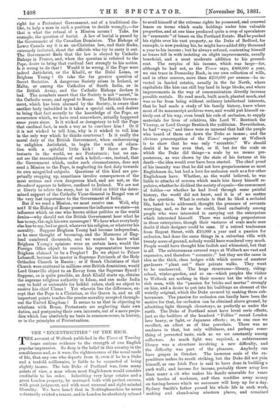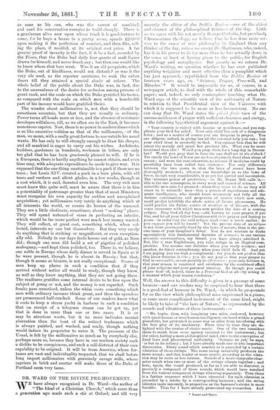THE "ECCENTRICITIES" OF THE RICH. T HE account of Welbeck published
in the Times of Tuesday bears curious evidence to the strength of one English popular impression. So deep is the belief in this country in the sensibleness and, as it were, the righteousness of the usual mode of life, that any one who departs from it, even if he be a Duke and a tenfold millionaire, is liable to be suspected of being slightly insane. The late Duke of Portland was, from many points of view, a man whom most Englishmen would consider creditable to his order. Inheriting very large estates and a great London property, he managed both with perfect success, with great judgment, and with most unusual and right-minded liberality. We have heard that in Nottinghamshire he never voluntarily evicted a tenant, and in London he absolutely refused
to avail himself of the extreme rights he possessed, and renewed leases on terms which made holdings under him valuable properties, and at one time produced quite a crop of speculators in " remnants " of leases on the Portland Estate. Had he pushed his rights over his vast property, as the Duke of Bedford, for example, is now pushing his, he might have added fifty thousand a year to his income ; but he always refused, contenting himself as leases fell in with insisting on slight improvements, usually beneficial, and a most moderate addition to his ground- rent. The surplus of his income, which was large—for, although he had not, as the Times says, 2400,000 a year, we can trace in Domesday Book, in our own collection of wills, and in other sources, more than £250,000 per annum—he in- vested in landed estates, usually in the far North, where capitalists like him can still buy land in large blocks, and where improvements in the way of communication directly increase possible rentals. He read much, built much, planted much, and was so far from being without ordinary intellectual interests, that he had made a study of his family history, knew where most of its manuscript archives were, and would put himself en- tirely out of his way, even break his rule of seclusion, to supply materials for lives of relatives, like Lord W. Bentinck the Viceroy, or Lord George Bentinck the politician. Nevertheless, he had " ways," and these were so unusual that half the people who heard of them set down the Duke as insane ; and the obvious preoccupation of the Times' reporter at Welbeck is to show that he was only "eccentric." We should doubt if he was even that, or if, but for the scale on which the Duke did things—a scale by no means pre- posterous, as was shown by the state of his fortune at his death—the idea would ever have been started. The chief proof of his insanity was that he did not love gregariousness as most Englishmen do, but had a love for seclusion such as a few other Englishmen have. Whether, as the world believed, he was liable to attacks of eczema which made him fancy himself re- pulsive, whether he disliked the society of equals—the commonest of foibles—or whether he had lived through some painful history, the world did not know, and it is of no matter to the question. What is certain is that he liked a secluded life, hated to be addressed, thought the presence of servants worrying, and, so far as he could, lived exclusively among people who were interested in carrying out the enterprises which interested himself. There was nothing preposterous in those enterprises, though their vastness of scale made men doubt if their designer could be sane. If a retired tradesman from Regent Street, with £10,000 a year and a passion for seclusion, had done the same things in a suburban villa with twenty acres of ground, nobody would have wondered very much. People would have thought him foolish and whimsical, but that is all. The subterranean covered ways at Welbeck are vast and expensive, and therefore " eccentric;" but they are the same in idea as the thick, close hedges with which scores of amateur gardeners " plant out " their private walks. They want to be unobserved. The huge structures—library, riding- school, winter-garden, and so on—which perplex the visitor to Welbeck are nothing in their essence but the whims of a rich man, with the "passion for bricks and mortar" strongly on him, and a desire to put into his buildings an element of the weirdly original, which the Duke secured by making them sub- terranean. The passion for seclusion can hardly have been the motive for that, for seclusion can be obtained above ground, by admitting light through clerestorys, as perfectly as under the earth. The Duke of Portland must have loved eerie effects, just as the builders of the hundred " Follies " round London love heavy, or light, or Japanese effects ; or, in one case we recollect, an effect as of blue porcelain. There was no madness in that, but only wilfulness, and perhaps some- thing of perverted taste, such as we see constantly among collectors. As much light was required, a subterranean library was a structure involving a new difficulty, and the difficulty was part of the pleasure. Anybody can have grapes in October. The immense scale of the ex- penditure makes its result striking, but the Duke did not pin himself, as one Irish Peer is said to have done in building a park wall ; and income for income, probably threw away less than many a cit who makes his family miserable for years with hordes of workmen, and then muddles away money on forcing-houses which no successor will keep up for a day. Sydney Smith's father passed his whole life in such work, making and abandoning nineteen places, and remained
as sane as his son, who was the sanest of mankind, and used Iris constructive energies to build cheaply. There is a gentleman alive now upon whose track it is good-fortune to come, to- be bays a house in a pretty scene, spends L-20,030 upon making it the perfection of comfort, and then flits, sell- ing the place, if needful, at its original cost price. A far greater proof of insanity is the fact, if it be a fact, recorded by the Times, that the Duke had daily four quarts of malt liquor drawn for himself, and never drank any ; but then one would like to know where that beer went. Was it an old perquisite, which the Duke, out of kindliness, would not disturb P or was it the very ale used, as the reporter mentions, to soak the oaken floors till they attained a special shade of colour. The whole belief of the public about the Duke was, in fact, due to the unusualness of the desire for seclusion among persons of great rank, and the scale on which the Duke gratified his tastes, as compared with the scale on which men with a hundredth part of his income would have gratified theirs.
The wonder about millionaires is, not that they should be sometimes eccentric, but that they are usually so ordinary. Power turns all heads more or less, and the absence of resistance developes wilfulness, till, as we often see in the East, it becomes monstrous caprice. Now, there is no power in modern times which is so like executive volition as that of the millionaire,—of the man, we mean, with a really great fortune to use outside his usual wants. He has only to will strongly enough to draw his cheque, and all mankind is eager to carry out his wishes. Architects, builders, gardeners in hundreds, workmen in tribes, are only too glad that he has been graciously pleased to will. If he is a European, there is hardly anything he cannot obtain, and even time may, with adequate expenditure, be made to give way. It is supposed that the one thing unattainable is a park if there are no
trees ; but Louis XI V. created a park in a bare plain, with old trees and verdure and silent glades, in a few weeks, though at a cost which, it is said, daunted even him. The very rich man must know this quite well, must be aware that there is in him a potentiality of patronage greater than that of most Ministers, must recognise his own capacity for sudden and unexplained acquisition ; yet millionaires very rarely do anything which at all interests the world, or rouses its horror of the unusual.
They are a little obstinate, sometimes, about " making " places. They will spend unheard-of sums in perfecting an interior, which would be far more perfect were much less money wasted. They will collect, at great cost, something which, when col- lected, interests no one but themselves. But they very rarely do anything that is striking or magnificent, or even exception- ally odd. Nobody in our days feeds horses out of gold, as Nero did ; though one man did build a set of pigsties of polished mahogany,—and kept them polished, too. There is, we believe, one noble in Europe whose daily dinner is served in Spain as if he were present, though he is absent in Russia ; but that, though it seems so bizarre, is not really exceptional. Scores of men keep up places in such a condition that if they arrived without notice all would be ready, though they know, as well as they know anything, that they are not going there. The readiness gratifies some internal desire to be free upon the subject of going or not, and the money is not regarded. Such freaks pass unnoticed, unless the whim costs something which men with ordinary incomes think great, and then the spenders are pronounced half-cracked. Some of our readers know what it costs to keep a steam yacht in harbour in such a condition that on receipt of a telegram steam can be got up, yet that is done in more than one or two cases. It is or may be atrocious waste, but it no more indicates mental aberration than the boat of the retired tradesman which is always painted, and washed, and ready, though nothing would induce its proprietor to enter it. The pressure of the Usual, is felt by the millionaires as much as by everybody else, perhaps more so, because they have in our modern society such a dislike to be conspicuous, and such a self-distrust of their own capability to be original. It will be from America, where for- tunes are vast and individuality respected, that we shall before long import millionaires with genuinely savage wills, whose caprices in brick and mortar will make those of the Duke of Portland seem very tame.



































 Previous page
Previous page